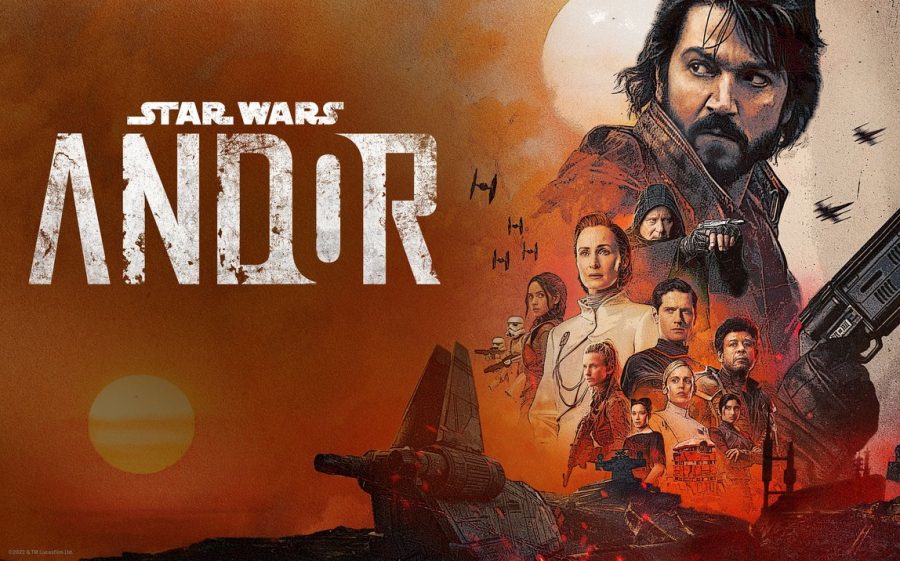Andor: An Analysis
January 11, 2023
Warning: This article contains major spoilers for the entirety of both Andor and Rogue One.
To begin, Andor, in my opinion, is not just a good Star Wars show, but a good show in general. The characters are well written, the pacing is well-executed, and it makes a clear argument. What truly satisfied me about Andor was the fact that it brought politics back to Star Wars. After the sequels (which didn’t happen, okay, they’re not canon, they didn’t happen, I think we as a society should just erase it from our memories), the shows Disney was putting out were decent, but despite the lore being entrenched in politics and political allegories, somehow managed to not really be political. Kenobi follows what happened to Obi-Wan, but doesn’t explore the early growth of the Empire. The Mandalorian was a compelling story about the importance of family, but the lack of exploration of a rebellion’s consequences is something of a missed opportunity. Andor says “screw all that, Star Wars is political” and brings in everything the Star Wars canon gives us.
Cassian Andor
“I think it’s all useless…It’s better to live. Better to eat, sleep, do what you want. You don’t know me. I fought in Mimban when I was 16.” – Episode 4, Cassian to Luthen. Cassian in the beginning of the series is so jaded by the Empire that he sees no purpose in fighting. He is self-centered and for good reason: all he’s ever known is struggle, all he is ever trying to do is survive. He is disillusioned by the fact that he feels as though he does not have any effect on the Empire at all. Even when he eventually does agree to work for the Rebel Alliance, he is working as Luthen’s mercenary.
After the deaths of his team, he goes back home and meets back up with his family to check back in. To his disappointment, Maarva says that she is not going with Cassian . He doesn’t understand this and voices his concerns but still he walks away without Maarva; he should not be judged for doing so, Maarva certainly doesn’t. He tells Maarva that he’ll be back, which becomes somewhat of a catchphrase. Cassian starts to establish that if there is someone his family and friends can rely on, it is himself. Cassian has been looking for a vacation, a break from a war he never chose to enlist in since he was a child. He finally gets this opportunity and he seizes it, but the tragedy of his story is that the Rebellion is not something he could choose to escape, the reality of his situation of experiences is that he does not have the privilege to step away. He gets caught in a charge that has nothing to do with him, is imprisoned with a ridiculously long sentence, and he is not allowed to protest.
Cassian gets shipped off to Narkina 5, a planet where the Empire has decided to keep some of its prisons. The prison he is sent to is a manufacturing one, later revealed to be building the Death Star. It is in this prison where we see the distinct turnaround of his mentality when it comes to fighting the empire. “I’d rather die trying to take them down, than die giving them what they want.” – Cassian to Kino, Episode 10. Here Cassian finally understands what Maarva was getting at when she refused to leave with him, what Luthen was trying to explain to him, what Nemik died for. This sentence is the thesis of Cassian Andor’s story, something we see even through Rogue One. Ultimately, Cassian dies for something he will never see come into fruition, and we see here how he gets to that point of faith. Cassian has been fighting against the Empire since he was 6 years old, he just hadn’t realized it yet. In Rogue One, Cassian is a zealot, willing to do anything for the rebellion. We now know why. He’s lost so much to this cause, he’s lost so much because of the Empire. His radicalization is so important because politically, he was already radicalized, but it was his faith in himself and humanity that he needed to learn.
Notable Side-Characters
Nemik’s one of the truest believers in the cause. When he said “Tyranny requires constant effort. Authority is brittle. It breaks, it leaks. Oppression is the mask of fear. Remember that.” (Nemik’s manifesto, Episode 12), he was calling ordinary people to arms. One of the beautifully shown parts of Andor was the way the small people did their own little things to fight back. From the sign language on Narkina 5, to Brasso tampering with the Pre-Mor ship, to the people of Ferrix making noise to psych out the Pre-Mor authorities, to Wilmon Paak building a pipe bomb to use against the Empire, none of these connected with each other besides fighting the fascism of the Empire. Nemik understands this, because he, like all of these people, have been radicalized from their experiences of just simply trying to survive the oppression. One of my favorite lines from Nemik is one of his last lines where he says in his manifesto, “Remember this. Try.” It juxtaposes one of the more famous lines from the franchise, from when Yoda scolds Luke, “Do or do not. There is no try.” Likely, the reason for this difference is in the supernatural. Yoda and Luke are connected to an external, supernatural entity— the Force. But people like Nemik, normal people who don’t have access to the Force, they can’t afford the binary, the finality of “Do or do not.” It is because of the average people that the Rebel Alliance was able to become what it was by the time of the original trilogy. The reason why Luke had the cushion of support was because of the efforts of people like Nemik. Luke needed to be able to succeed, fully, but the only way he was able to have that opportunity to finally win is because the Rebel Alliance was already built up by the people who were just trying to do whatever they could to survive.
We see Kino’s radicalization happen in the span of a single episode. Kino tries so hard to be an ideal prisoner, he follows the rules, keeps his men in line, and is banking on getting out of there alive. He has built his mind completely around the fact of obeying the Empire. He is so concerned about even talking about breaking out or musing about it because he’s worried that someone is listening in. The use of the line, “How many guards on each floor?” is used to show the process of radicalization. In the beginning of Episode 9, he refuses to respond or even humor Cass. The last lines of the episode are exchanged between Cassian and Kino – “How many guards on each floor?” “Never more than twelve”. Here we see a man angry and broken. He tried so hard to be a good prisoner but with the knowledge that they were never getting out, he finally turns to escape. He realizes even when playing with the rules of the Empire, there is no winning. When in a game where the other side is an empire, an organization so big as a government, playing by their rules means nothing to them. Going on peacefully changes nothing, it just makes you all the more easier for them to ignore. But if you cause a problem? If you are even a bit of nuisance, the slightest bit of a thorn? That is when change will come.
The Prison-Industrial Complex
If you do not let your prisoners vote, those in power now have strong motivation to imprison their enemies. This is a very basic rule in civics, something we see in both the United States as well as The Empire. The Empire is actively sending out people to capture Rebels and anyone who is remotely against the Empire, since they don’t let any news of what happens inside the prisons reach the outside and because they don’t allow their prisoners to vote. The reason why the levels of incarceration is so high in the United States is because slavery is legal in prison— this loophole in the 13th Amendment provided ample motive for the US government to imprison people of color or those who would stand against them. In a similar line of thought, the portrayal of the prison-industrial complex in Andor is brilliant. The prison-industrial complex is the idea of the relationship between a government and the various businesses that benefit from the institute of incarceration. We see that the government directly benefits from having people incarcerated, and not just because they are keeping supposed criminals, but because they are attempting to build something they will profit off of. They have incentive to imprison people for more petty crimes for longer sentences because they need to generate a self-replenishing workforce to build the Death Star. This sounds somewhat familiar because that is similar to what the US prison system has done to black communities.
How Andor Increased the Tragedy of Rogue-One Instead of Diminishing it
Often in prequel shows or movies, the writers try to make the tragedy of the original work hurt less. They try to soften the blow. Not Andor.
Cassian goes through hell and back, orphaned at a young age and taken from his sister and home planet while the rest of his people are killed. His life is nowhere near easy, and time after time he is roped into rebel activity. Eventually working for the rebellion on his own motivation, he goes through a whole character arc; again and again, he watches people die for a cause that they will never see come to fruition. He makes bonds with these people and gets close to them, only to see them die. Despite this, he learns that it’s worth it, is prepared to do the same (“Kill me or take me in”), and he realizes that everyone makes a difference, all of the small and big acts. And in the end, he does die for it. At the end of Rogue One, he dies. All of his friends die.
But the tragedy? He had finally, finally, reached happiness. After years of running and fighting in a war that he had no choice but to participate in, he finally finds love: Jyn Erso. And something we’re shown in the show is that he goes through trial after trial, just barely surviving. He survives the attack on his planet, then the attack on his home, then the prison break, then the manhunt- no matter what, he always survives. He always finds a way to keep going, even when things seem dire. Every single time. Except for one. Except for that last time on the beach, when they knew they were about to be killed by the Death Star, what did he do? He sat on that beach with Jyn Erso, and they held each other, knowing that this is the only time that they would be able to spend with each other as a couple. They sat there on that beach and faced death, together, peacefully, after succeeding. They won and they knew it and they knew they would never get to see it. They knew that they would never truly get to be together, and that was okay.




